Cassandra Page's Blog, page 18
April 7, 2016
Review: ‘Fairest’ by Marissa Meyer
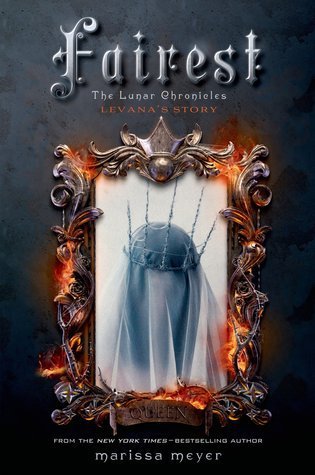
In this stunning bridge book between Cress and Winter in the bestselling Lunar Chronicles, Queen Levana’s story is finally told.
Mirror, mirror on the wall,
Who is the fairest of them all?
Fans of the Lunar Chronicles know Queen Levana as a ruler who uses her “glamour” to gain power. But long before she crossed paths with Cinder, Scarlet, and Cress, Levana lived a very different story – a story that has never been told . . . until now.
There aren’t too many authors who are so popular that even their novellas get a traditional paperback release (most bridging novellas are released as ebook only, or maybe POD). Marissa Meyer’s Fairest is one of these rare books and, having devoured it in an evening, I can see why.
Fairest is book 3.5 of the Lunar Chronicles. If you’re not familiar with the premise of this series, it’s basically an alternate Earth sci-fi where each book in the series is inspired by a fairytale. But the books don’t really stand alone; there is an overarching storyline, with the stories of Cinder, Scarlett, Cress and now Levana intertwining. (Winter’s story comes next.)
Levana is the queen of Luna, the moon colony; think the wicked queen from Snow White and you have her basic character concept. Pretty one-dimensional, right? Nope. The beauty of Fairest is that we get to find out how untrue that characterisation is. The story begins when Levana is fifteen and her parents are assassinated, and follows her sister’s coronation, Levana’s “romance” with the guard Evret and pseudo-adoption of Winter, the birth of Selene, and all the horrible things that follow. We get to see through both current events and flashbacks just why Levana starts out a little bit damaged … and why by the end she’s as broken as the the mirror on the wall.
The thing is, despite all the awful things Levana does and who she turns into, you can’t help but feel bad for her. She’s a product of a terrible environment, and one part of her just wants to be loved. Of course, that in no way excuses her behaviour — from murder to what amounts to rape and psychological torture — but you can’t help but think that if someone had taken her away from her family when she was a small child, she could have been a wonderful person. Certainly she’s not as inherently evil as her older sister, Channary, not at first … although that’s setting the bar pretty low.
I mentioned rape and torture. Levana is a Lunar and has the gift to influence others’ minds and control their bodies … and Evret doesn’t want to be anything more than her friend. It’s fair to say there is no romance in this book. There were times I felt physically ill at the things she did to that poor, poor man. Still, what sex there is fades to black — it is a young adult series.
All of this amounts to an amazing five-star read, because you have to admire the talent of a writer who can make you pity and loathe a character all at once. If you’ve read the other books in the series and are wondering whether to dip into the novella: DO. You won’t regret it. And if you haven’t read any of the series, start with Cinder.



April 4, 2016
Ten examples of how the English language is trolling us
Regular readers of my blog will know that my full-time job is as an editor. You’d think that I’d be fully across all the various, ugly, beautiful permutations of English and its stupid-arse spelling.
You’d be wrong.
What brought this to my attention most recently is that in my latest manuscript I spelled “lightning” wrong. Like, every single time. My finger itches to put an e in there, but noooooooo, that would be the verb meaning to make something lighter. As in, “The lightning is lightening the sky.”
Because obviously.

Now, to be fair, since I don’t work for the BOM, I don’t read about lightning in my job very much — so it isn’t something I’ve had trained out of me. But still, I did want to pull my hair out a little bit.
Here are some other examples of the ways that English is trolling us:
Alter / altar. One is the verb meaning “to change”; the other is a sacred table or platform at which religious offerings are made.
Baited / bated. One is describing something with bait (such as worms) attached. The other means “restrained” (with relation to breathing) — so the phrase “with bated breath” means with held breath, not with a mouthful of raw prawns. On behalf of all those romance heroines out there, I think we can say that’s a relief.
Blonde / blond. I gather this one is the fault of French, which has gendered adjectives. There, blonde is feminine and blond is masculine. In English, that’s sorta kinda true, but the application varies; my former publishing house’s convention was that “blond” was the adjective that describes hair colour and “a blonde” is a woman with blond hair.
Compliment / complement. The first is a nice thing someone says about you; the second has a bunch of meanings but generally relates to something that completes a thing or makes it perfect.
Climatic / climactic. One relates to weather; the other is the, er, climax of something. I have seen the wrong one used. Who knew weather could be so exciting?
Discreet / discrete. The first is wise, prudent or judicious; the second is detached or distinct. (I still have to look this one up every time.)
Exercise / exorcise. The first is physical activity and the second is to drive out an evil spirit — possibly in response to having seen me exercise! (Scary stuff.)
Grizzly / grisly. The first is something grey or a type of bear (but not a type of bare!). The second is something gruesome.
A sanction can be both authoritative permission and a provision of a law that enacts a penalty for disobedience — so two things that are OPPOSITE to one another. And in my dictionary, at least, as a verb it always means to approve or ratify something — so sentences such as “the UN sanctioned X country for breaching Resolution 1234” are actually saying that the UN approved the country’s actions rather than punishing it. Oh, UN, you so crazy.
Storey / story. One is a floor of a building; the other is a tale we tell ourselves. (This one’s not for US readers, who I gather use “story” for both…?)
So, all of that being the case, how do you avoid your writing being full of hilariously climaxing environments and buildings where each floor is a tale (but not a tail) of wonder (but not wander)? The answer is at once deceptively simple and also a lifelong job:
Read a lot
Own (and use) a current-edition dictionary of the specific English variant you’re using
Proofread your work (I noticed an incorrect “it’s” when I proofread this blog post — gah!)
Proofread it again (I did)
Have someone else proofread your work — copy editors are worth their weight (not wait) in gold
Make a list of words you know you get confused, and then double-check their usage whenever you see (not sea) them
What’s your favourite pair of words that are usually mixed up? Are they about meeting the principled principal? Having dessert in the desert? Eliciting illicit activity? I need (not knead) to know now!



April 1, 2016
Review: ‘Any Port in a Storm’ by Emmie Mears
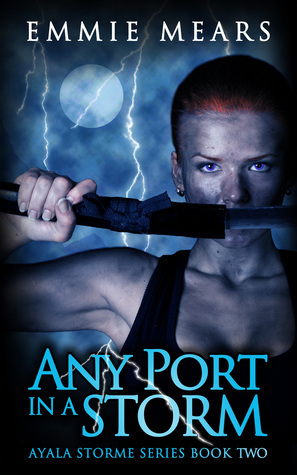
After months of training a budding army of human/demon hybrids, Ayala and Carrick have worked out most of their differences.
Who gets to use the bathroom first in the morning. Who’ll feed the bunny before they go out to make mayhem. Who gets to keep the jeeling claw they found in Forest Hills. You know, the important stuff.
But when Gregor sends them out with their battalion of shades and the mission quickly lands on the wrong side of Ayala’s “don’t kill norms” moral line, she quickly discovers that maybe morality wasn’t the motivator behind Gregor’s pet project — or at least not when money’s involved.
And when a trio of shades starts murdering the populace in Nashville again and targeting places and people significant to Ayala, her desire to help her own comrade shades stay on the good side of the Mediators will place her at their mercy again.
With the Summit fracturing and demons closing in on the city, saving the shades and herself may cost Ayala everything.
This is the sequel to Storm in a Teacup, one of my new favourite urban fantasy series. (You can see my review of the first book here.) It’s fun, past-paced and clever, and Emmie Mears’s voice again doesn’t disappoint. The main character, Ayala, could sass for her country!
Sadly for her, she’s instead stuck killing demons, and trying to avoid getting sucked into the sort of intrigue that inevitably pops up when you have a large group of people working together — even if those people are Mediators, people destined from birth to be unpaid monster-hunters. And political intrigue isn’t the only thing she could be sucked into: the demon-infested swamp that is encroaching on Nashville (where the books are set) and the maws of the demons themselves are also ongoing concerns.
Any Port in a Storm doesn’t stand alone, so if you haven’t read the first book, you’ll be very lost with this one. (Go read the first book. We’ll wait.) It continues some of the plot threads from the first book, introduces some new ones, and continues the meta-plot that is the looming threat of the demons’ overall plan — whatever that turns out to be. There is a conclusion of a sort, but as with the first book some threads are left untied to continue in the next one. (Think of it like a season of Buffy: the monster of the week is more or less dealt with, but the season’s Big Bad soldiers on.)
Any Port in a Storm contains some swearing, but there’s no sex or even kissing. The relationships revolve around friendships and family, which I found a refreshing change; urban fantasy, unlike paranormal romance, isn’t all about the love interest. And although I didn’t mind Mason in the first book, I didn’t ship him and Ayala, so him being gone didn’t bother me so much.
I enjoyed this book enough that I one-clicked the third book in the series, Taken by Storm, and can’t wait to get my teeth stuck into it. If you loved Buffy, you should definitely check out Ayala!



March 24, 2016
Review: ‘Elantris’ by Brandon Sanderson
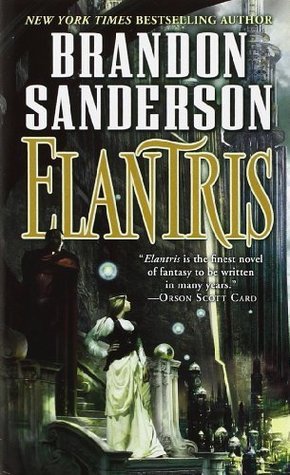
Elantris was the capital of Arelon: gigantic, beautiful, literally radiant, filled with benevolent beings who used their powerful magical abilities for the benefit of all. Yet each of these demigods was once an ordinary person until touched by the mysterious transforming power of the Shaod. Ten years ago, without warning, the magic failed. Elantrians became wizened, leper-like, powerless creatures, and Elantris itself dark, filthy, and crumbling.
Arelon’s new capital, Kae, crouches in the shadow of Elantris. Princess Sarene of Teod arrives for a marriage of state with Crown Prince Raoden, hoping — based on their correspondence — to also find love. She finds instead that Raoden has died and she is considered his widow. Both Teod and Arelon are under threat as the last remaining holdouts against the imperial ambitions of the ruthless religious fanatics of Fjordell. So Sarene decides to use her new status to counter the machinations of Hrathen, a Fjordell high priest who has come to Kae to convert Arelon and claim it for his emperor and his god.
But neither Sarene nor Hrathen suspect the truth about Prince Raoden. Stricken by the same curse that ruined Elantris, Raoden was secretly exiled by his father to the dark city. His struggle to help the wretches trapped there begins a series of events that will bring hope to Arelon, and perhaps reveal the secret of Elantris itself.
My high fantasy audiobook kick continues with Elantris. After I finished Patrick Rothfuss’s two books, I tweeted that I was after something similar: non-political high fantasy that isn’t too grim (ie not Game of Thrones). Pretty much every tweet recommended Brandon Sanderson. The friend who’d gotten me onto Rothfuss in the first place suggested I start with Sanderson’s debut. Since it’s that rare beast — a stand-alone epic fantasy novel — I figured, why not?
And I LOVED Elantris.
It’s a rare example of a split POV book that works — and there aren’t just two but three points of view, those of Raoden, Sarene and Hrathen. The chapters rotate between the three — in that order, something I admired from a craft point of view. Keeping the pacing going and making each thread interesting enough that you always have something to say with each character is hard, and Sanderson did an admirable job. I actually didn’t mind when it switched to a new character, where other multiple-POV books have lost me in the past. I also really liked the way he interwove the various plot threads and foreshadowing, with elements sprinkled through each character’s scenes.
As far as the characters go, Raoden is a sweetheart — a genuinely kind and positive person, something that serves him well when he gets to Elantris. Sarene is a strong-willed diplomat who is just looking for somewhere to belong. And Hrathen is the bad guy. Only actually not. In high fantasy, usually the villain is truly evil, and after Sarene’s introduction you expect Hrathen to be that sort of person. But he’s actually quite sympathetic, and his motivations are (despite the emphasis on world conquest) coming from a good place.
That isn’t to say that there aren’t villains in Elantris, just that Hrathen isn’t necessarily one of them. ;)
I also really enjoyed the magical system, which wasn’t your traditional spellbook memorisation. It’s a bit closer to the Will and the Word that Eddings used (way back when), but the word is written and precision is critical to the process.
I downloaded the tenth-anniversary edition audiobook and there was some extra content, including a deleted storyline and some discussion of the craft. I found Sanderson’s reflections on the book quite interesting. Sanderson commented that his craft has advanced since he wrote Elantris, and I can see the elements of the story that he’d probably fix if he re-did it now (such as Hrathen’s info dumps or some of the repetitive description — I lost track of the number of times we’re told that Sarene’s uncle has a scratchy voice). Still, the craft that went into Elantris is still admirable, and if he gets better in his future works, I’m definitely keen to read them next.



March 20, 2016
Promotion: ‘Isla’s Inheritance’ ebook available free

Isla was content to let her father keep his secrets, but now she can’t stand the touch of iron and her dreams are developing a life of their own.
Seventeen-year-old Isla Blackman only agrees to participate in a Halloween séance because Dominic, an old crush, wants to. She is sure nothing will happen when they try to contact her mother’s spirit. But the séance receives a chilling reply.
SHE IS NOT DEAD.
Isla doesn’t want to upset her father by prying into the family history he never discusses. When the mysterious and unearthly Jack offers to help her discover the truth, Isla must master her new abilities to protect her loved ones from enemies she never knew existed.
Isla’s Inheritance, the first book in my young adult urban fantasy trilogy, is currently available as a free download from all good* ebook retailers.
Amazon US | Barnes & Noble | iBooks | Kobo | Smashwords
* Amazon is, as many have noted before me, not a good ebook retailer. In fact, I have it on good authority that it may have been given a lump of coal (delivered free with Amazon Prime!) for Christmas last year. ;) So if your Amazon account isn’t based in the USA and your Amazon store lists Isla’s Inheritance with a price, you can download the mobi file for free from the Smashwords link instead. Or leave a message and I will email it to you.
If you enjoy Isla’s Inheritance — or any of my other books, or other authors’ books for that matter — please consider leaving a review on Goodreads or your favourite ebook retailer. Reviews make a huge difference to authors; you wouldn’t believe how much us needy creative types need the positive reinforcement. ;)



March 5, 2016
Review: ‘Eleanor & Park’ by Rainbow Rowell
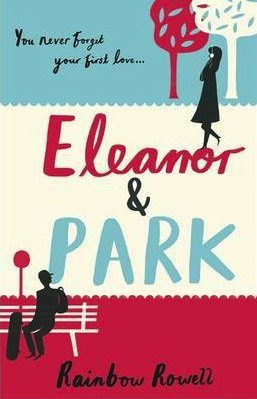
Eleanor is the new girl in town, and with her chaotic family life, her mismatched clothes and unruly red hair, she couldn’t stick out more if she tried.
Park is the boy at the back of the bus. Black T-shirts, headphones, head in a book – he thinks he’s made himself invisible. But not to Eleanor… never to Eleanor.
Slowly, steadily, through late-night conversations and an ever-growing stack of mix tapes, Eleanor and Park fall for each other. They fall in love the way you do the first time, when you’re young, and you feel as if you have nothing and everything to lose.
I bought this over a year ago, and it’s taken it this long to work to the top of my TBR pile. So I expect most of you will have already read it if you’re going to, but anyway…
I really enjoyed Eleanor & Park, for so many reasons, but I didn’t adore it — and I’m really struggling to put my finger on exactly why that is. Maybe I was in the mood for something a little more fun? I didn’t really know much about the book except that it was a contemporary romance set in the 80s (or do the 80s count as historical now?!).
Don’t get me wrong, there are fun parts to Eleanor & Park — I started high school at the end of the 80s so all the references to mix tapes and big hair made me gigglecringe (that’s totally a word). I loved their banter about comic books, and the way they bonded over them almost by accident. When Park tells Eleanor he’s going to give her the best Batman comic ever to read and she makes a crack about how in that one Batman raises two eyebrows instead of one, I laughed. A lot.
But, well, when the blurb talks about Eleanor’s chaotic family life, chaotic isn’t the right word. Horrific. Abusive. Dreadful (in the sense that, as a reader, it fills you with dread). It isn’t a fun place to experience. Park becomes Eleanor’s escape from all that, and I loved him for it — almost as much as she loved him.
As far as the plot goes, this story is heavy on the romance. I saw the plot twists coming — I tend to do that in romances; I don’t know why that is given I don’t read that many. But I didn’t mind too much. It was definitely a fast read, and technically well executed.
Rainbow Rowell’s writing is very, very good. She jumps between Eleanor’s and Park’s perspective all the time, but with little subheadings so you know who you’re reading about (it’s not just sloppy head-hopping like you sometimes see). There isn’t much description of the world around them — only the things that they think are important, which works. My favourite scenes were the high-emotion scenes where she gives you a snippet from each character and their thoughts mirror one another. It was so beautiful. *sniff*
The other thing worth mentioning is that both Eleanor and Park come across as real people. Park is half-Korean and looks it (unlike his brother, who looks more Irish). Eleanor is overweight. One of the sweetest things is that, when you see each character through the other’s eyes, they are the most beautiful things ever. Park never even seems to notice that Eleanor is overweight. Eleanor does notice that Park looks Korean, but she adores everything about him — especially his skin and his eyes.
If you love contemporary YA, 80s perms, comics and mix tapes, then Eleanor & Park is definitely worth checking out.



March 2, 2016
Review: ‘You’re Never Weird on the Internet (Almost)’ by Felicia Day
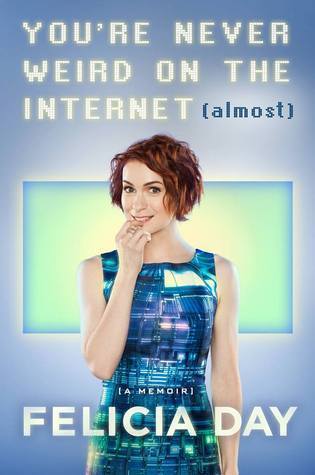
From online entertainment mogul, actress, and “queen of the geeks” Felicia Day, a funny, quirky, and inspiring memoir about her unusual upbringing, her rise to Internet-stardom, and embracing her individuality to find success in Hollywood.
The Internet isn’t all cat videos. There’s also Felicia Day—violinist, filmmaker, Internet entrepreneur, compulsive gamer, hoagie specialist, and former lonely homeschooled girl who overcame her isolated childhood to become the ruler of a new world… or at least semi-influential in the world of Internet Geeks and Goodreads book clubs.
After growing up in the south where she was “home-schooled for hippie reasons”, Felicia moved to Hollywood to pursue her dream of becoming an actress and was immediately typecast as a crazy cat-lady secretary. But Felicia’s misadventures in Hollywood led her to produce her own web series, own her own production company, and become an Internet star.
Felicia’s short-ish life and her rags-to-riches rise to Internet fame launched her career as one of the most influential creators in new media. Now, Felicia’s strange world is filled with thoughts on creativity, video games, and a dash of mild feminist activism—just like her memoir.
Hilarious and inspirational, You’re Never Weird on the Internet (Almost) is proof that everyone should embrace what makes them different and be brave enough to share it with the world, because anything is possible now—even for a digital misfit.
If you’re a fan of Joss Whedon’s work, you may remember Felicia from his hit internet web series, Doctor Horrible’s Sing-along Blog. She played Penny. *sniff* She’s also been on Buffy, Supernatural, and lots of other shows … but before she was on Doctor Horrible, she created her own web series, The Guild.
The Guild is inspired by Felicia’s own experiences in online computer games, especially her addiction to World of Warcraft. I had a WoW addiction myself there for a couple of years (though I still managed to go to work), so the show and its characters really resonated for me. In fact, I quit WoW when I got pregnant because I “didn’t want to be a Clara” (the sweet but very neglectful mother in The Guild).
So I guess I owe Felicia a big thank you for saving my son’s childhood! Yay!
All of this is by way of explanation for why I picked up this book, and why I loved it — and Felicia — so, so much.
You’re Never Weird on the Internet (Almost) is a relatively quick read (or listen — I bought the audiobook, which is narrated by the charming Felicia herself). And it’s one I thoroughly recommend for geeks. If you didn’t understand my paragraph about WoW, then some of the stuff in the book may go over your head. Although Felicia does a really good job of making the geek jargon accessible, I am not qualified to say how good a job she did, because I already knew what she was talking about.
Felicia is very honest about herself, her upbringing and her failings: she describes herself variously as anxious, driven and a control freak, and provides many, many examples of each. The book reveals things about her that I didn’t know, including how awful things got for her after she got doxxed by GamerGate. (I wanted to give her a hug, and then set fire to certain parts of the internet.)
What she doesn’t talk about is her adult personal life. She mentions several times that she has a boyfriend, but if you’re expecting salacious details, don’t hold your breath — she never even says what his name is. On the other hand, given the doxxing, who can blame her? Likewise, she mentions that she’s no stranger to restraining orders and talks about a disturbed fan turning up at her house, but doesn’t go into details about any of it. Again, fair enough.
Still, if you want to hear funny anecdotes about her homeschool experience, singing lessons, university violin performance, acting experience and so much more, this book is wonderful. I especially recommend it for the embarrassing stories of Felicia geeking out over other celebrities at fan conventions. That made me feel so much better about my incoherent behaviour whenever I’ve ever met anyone even slightly famous.
Thanks, Felicia!



February 27, 2016
Review: ‘Wake of Vultures’ by Lila Bowen
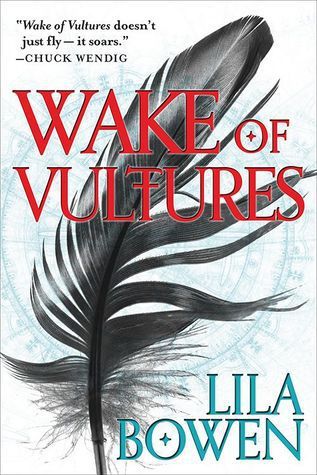
A rich, dark fantasy of destiny, death, and the supernatural world hiding beneath the surface.
Nettie Lonesome lives in a land of hard people and hard ground dusted with sand. She’s a half-breed who dresses like a boy, raised by folks who don’t call her a slave but use her like one. She knows of nothing else. That is, until the day a stranger attacks her. When nothing, not even a sickle to the eye can stop him, Nettie stabs him through the heart with a chunk of wood, and he turns into black sand.
And just like that, Nettie can see.
But her newfound sight is a blessing and a curse. Even if she doesn’t understand what’s under her own skin, she can sense what everyone else is hiding — at least physically. The world is full of evil, and now she knows the source of all the sand in the desert. Haunted by the spirits, Nettie has no choice but to set out on a quest that might lead to her true kin… if the monsters along the way don’t kill her first.
A historical fantasy about a half Native American, half African American bisexual girl who dresses like a man? This is the book I didn’t know I needed till I had it. Delilah S. Dawson (writing here as Lila Bowen) is one of my favourite authors, and I confess that I probably wouldn’t have picked this up if she hadn’t written it — not for any particular reason, just because I don’t usually read books set in the American Wild West (or a facsimile thereof). So Wake of Vultures would never have even crossed my radar.
And that would’ve been a tragedy, because Nettie Lonesome’s story is a cracking read. The action whisks you along, and it doesn’t get bogged down in self-reflection — though there is certainly a bit of that, as poor Nettie has received exactly no education and, as other characters keep telling her, has a lot to learn about people. Consequently, she is baffled by notions like bisexuality or why a woman would actually choose to wear skirts rather than pretending to be a man.
From my (admittedly white, non-American) perspective, Dawson/Bowen handled the issues of race and gender identity with tact. There’s no stereotyping — there are good and bad guys both white and “Injun” (as Nettie refers to them, given she was raised by whites; the phrase is something the author acknowledges is not PC these days but would have been accurate in the 1800s Texas that Durango is based off). Even the monsters have a range of good and bad types.
As far as the monsters go, if there’s a method to determining the ones we encounter then it isn’t made clear to Nettie — and therefore us — in this book what that is. There are vampires, harpies, werewolves, skinwalkers, the Cannibal Owl (a Native American bogeyman), dwarves and bludbunnies (a critter from Dawson’s steampunk series). I guess European-mythology creatures can emigrate just as easily as Europeans can!
I enjoyed the other characters, particularly Winifred — who is the first female Nettie really gets to know who is happy and proud to be female — and Sam Hennessey, one of her fellow Rangers. There is a hint of romance in the story, but if you only like your romance to include kissing scenes and heavy petting, you won’t find any of that here (the closest we come to a kissing scene actually made me cringe for poor Nettie and the other party). I actually liked that, though. Nettie is so confused by who she is and what she wants that if she’d jumped into the sack with someone it would’ve seemed very out of character.
I can’t wait for the next book in the series, Horde of Crows. The ending isn’t a cliffhanger per se, but it sure left me wanting more.



February 22, 2016
Writing reviews: my philosophy
Before I start, I feel I should point out that this post isn’t my review policy.
This is my review policy:
I’m not primarily a book blogger, and I don’t take review requests; I post reviews for books I happen to be reading and felt strongly enough about that I wanted to share my thoughts with others. Please don’t ask me to review your book — as my local grocery says, refusal may offend.
Although that makes me wonder exactly how they refuse! ;)
So. Having established that, let’s move on.
Before I joined Goodreads I wasn’t a book reviewer. A book addict, yes, but I didn’t leave reviews anywhere … unless you count enthusiastic word of mouth. I joined that site in 2012, but mostly used it to sort and track my reads. If I left reviews, they were a paragraph or less. I did leave star ratings, though.
That changed in mid-to-late 2013. By then I’d joined Twitter and started blogging with Aussie Owned and Read, and I’d really begun to understand how vital reviews are to authors, especially indie and mid-list authors who struggle to get the word out. That was when I started writing longer reviews and blogging about them, becoming a pseudo-book blogger.
I call myself a pseudo-book blogger, because I’m only on the fringes of the very enthusiastic and dedicated book blogging community. I don’t get free ARCs from publishing houses — thank goodness, as I don’t think I could handle the pressure — or chase ARCs in general. I buy my books, because I love to support authors. And I love to own books.
(I got heckled by the removalists as they were hauling box after box of books up to what is now my study. True story.)
Goodreads helpfully pointed out to me the other day that my average star rating for all the books I’ve reviewed since I joined Goodreads is 4.38 stars. They even provide a handy graph.

I remember having a discussion with another reviewer where I gave something four stars and then listed a few things that left me wanting more in the book. She told me that, if it were her, such a review would carry a three-star rating at best.
All of which got me to wondering whether I rate books too highly when I review them.
For those that aren’t familiar with the Goodreads star ratings, they are:
One star: Did not like it
Two stars: It was ok
Three stars: Liked it
Four stars: Really liked it
Five stars: It was amazing
After thinking about it, though, I’ve come to the conclusion that, by those descriptions, I’m rating just fine, in my own way. Here are a few reasons I think account for my high average ratings:
If I give something a half-star rating, I round up rather than down. This means that, at a guess, my true average would actually be in the high 3-stars. The reason I round up is because writing is hard work, and I prefer to be nice to fellow authors where I can. If maths gives them a slight bonus, I’m okay with that.
I’m not that risky a reader, all things considered. I know what I like, and that’s what I usually read. When I read outside my usual genres, it tends to be books by writers that I’ve met on social media or otherwise admire. This means I’ve been exposed to their writing before and generally have a sense for what I’m in for. (For example, I discovered Chuck Wendig’s and Delilah S. Dawson’s books by reading their blogs.)
On the handful of occasions I’ve read books where I really was tempted to give a low rating, I’ve usually just not rated the book. There are, of course, exceptions: for example, Red Riding Hood filled me with rage. I didn’t feel bad about one-starring it, because the decision that got under my skin was one the publisher (presumably) made, not the author. And I think we can all agree that publishing without the last chapter in a whodunit is a low blow.
Does choosing not to rate a book rather than give it a one- or two-star rating mean that my reviews somehow have less integrity? That’s one of the things I’ve been wondering. I don’t think that it does, but I guess others may agree. It kind of brings me back to what I said originally: I’m not a book blogger or professional reviewer. I review for fun, to spread the word about awesome stories that I’ve enjoyed.
What do you think? If someone reviews books, are they obliged to rate and review every book they read in all its messy glory?


February 19, 2016
Review: ‘William Shakespeare’s Star Wars: Verily, A New Hope’ by Ian Doescher
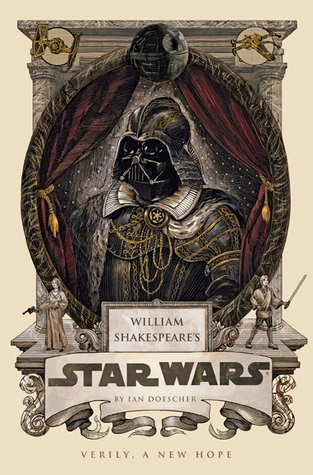
MAY THE VERSE BE WITH YOU!
Return once more to a galaxy far, far away with this sublime retelling of George Lucas’s epic Star Wars in the style of the immortal Bard of Avon. The sage of a wise (Jedi) knight and an evil (Sith) lord, of a beautiful princess held captive and a young hero coming of age, Star Wars abounds with all the valor and villainy of Shakespeare’s greatest plays. ‘Tis a tale told by fretful Droids, full of faithful Wookiees and fearsome Stormtroopers, signifying… pretty much everything.
Reimagined in glorious iambic pentameter, William Shakespeare’s Star Wars will astound and edify Rebels and Imperials alike. Zounds! This is the book you’re looking for.
I bought this as a present for a friend because the concept tickled me. When I got it home I started flicking through it … and before I knew it, I’d read the entire thing. (Sorry, Peter!)
Though I do love episode seven, I’d otherwise describe myself as a casual fan of the Star Wars franchise — I don’t own any of the DVDs and the only book I’ve read is Chuck Wendig’s Aftermath, because I’m a fan of his writing. Likewise, I’ve read some Shakespeare, but probably not since my university days.
Still, I’m familiar enough with each to recognise the famous quotes, which is fortunate, because I got a lot of joy from seeing Star Wars rendered in iambic pentameter, and from seeing Shakespeare quotes adapted to a Star Wars plot. (There was also a cheeky reference to Star Trek’s “boldly go” statement, which made me snigger.) Doescher has clearly taken a lot of care in adding these sorts of in-jokes for the reader, which take this book from a straight retelling to something both beautiful and slyly amusing.
The other thing I really liked about the adaptation is the Shakespearean use of the soliloquy to give glimpses into the true nature of each of the major characters. We hear C3PO talk about his true feelings for R2-D2 (despite his constant, snark-filled badgering), R2-D2 in turn reveal his disdain for C3PO, Darth Vader give a glimpse into the darkness in his soul, and Han reveal that he’s not just a scruffy criminal but something more. Luke’s starry-eyed desire for adventure and realisation it’s not all it’s cracked up to be makes me like his character than his whining in the movie did.
The language is a lot easier to follow than genuine Shakespeare too, because — although Doescher has used the rhythm and basic linguistic trappings — I didn’t have to look up any of the words to see what they meant. YMMV. As I said, I haven’t read Shakespeare for a long time!
I strongly recommend this for fans of the movies who also love a bit of Shakespeare.






